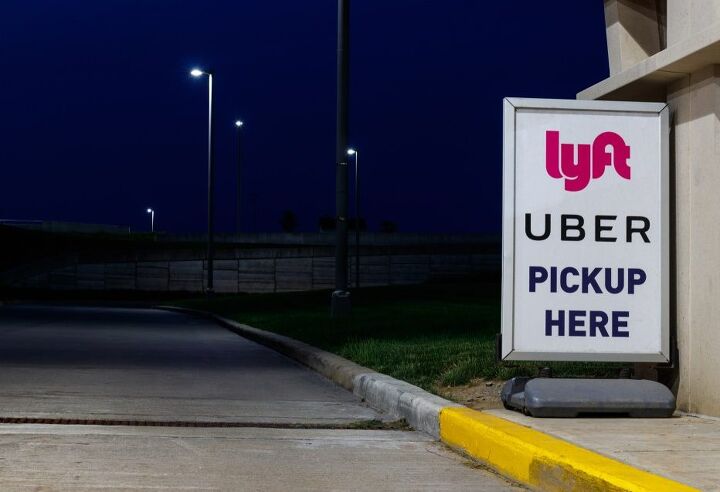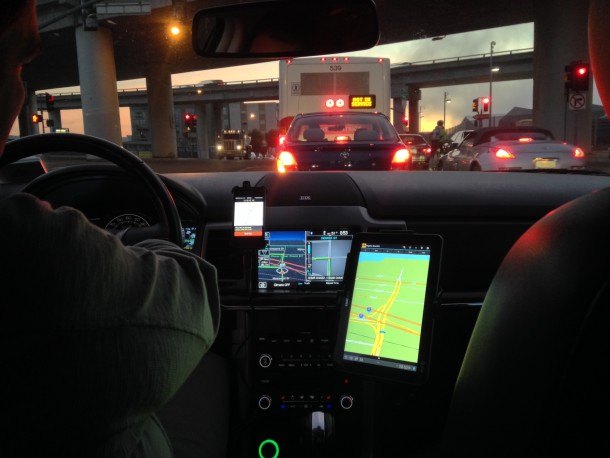#TechIndustry
Will Intel's Ohio Chip Plants Fix Automotive Supply Chains?
Intel has announced a $20 billion investment to transform a 1,000-acre plot in New Albany, Ohio, into the latest addition to its U.S. chip-manufacturing hub. Construction is scheduled to commence later this year with operations starting in 2025. But everyone’s wondering if it is going to be enough to rectify the pathetic state in which domestic vehicle production currently finds itself.
Uber Drivers Sue, Claim Company Pressured Them to Support Prop 22
A small group of drivers are suing Uber over repetitive in-app messages from the company about Proposition 22, a ballot initiative it would very much like them to support. Considering the deluge of political messages you’re undoubtedly getting on your own cellular device, you’re probably sympathetic to their plight. There are few things more annoying than being constantly reminded about an election nobody seems capable of shutting up about — especially when they can’t seem to get your name right.
But Uber likely crossed a line with its employees. While political action campaigns can inundate you with the most obnoxious and misleading election information, your employer isn’t supposed to. These drivers are claiming Uber violated their employment rights by trying to get them to support a ballot measure it has a vested interest in every time they checked their mobile device to hunt for a fare.
California Rules Uber/Lyft Must Reclassify Drivers
A California appeals court unanimously ruled against ride-hailing giants Uber and Lyft on Thursday, mandating that they would indeed need to reclassify drivers operating within the state as employees.
The duo have been pushing against Assembly Bill 5, which seeks to reclassify contracted, gig-economy workers as fully fledged employees entitled to all the associated benefits, all year. California even sued Uber and Lyft in May for refusing to comply with with the order but they’ve claimed AB5 will severely hinder (if not eliminate) their ability to operate within the state and have backed a measure called Proposition 22 that would grant them special exceptions.
Uber, Lyft Spending Big to Fight Californian Gig Economy Laws
California Blinks: Uber/Lyft Granted Extension on New Labor Laws
The battle between the purveyors of ride-hailing apps and the State of California has been an interesting one. The West Coast’s gig economy looked ready to be nuked from orbit following the passing of Assembly Bill 5 (AB5), leaving a glassy crater of jobless part-timers and the corporations that were dependent upon them — even though the stated goal of the rule was to protect gig workers from being taken advantage of.
Uber and Lyft looked to be the most impacted by the new law, as their entire business structure revolves around managing fares for drivers whose status as “independent contractors” was up for debate.
Claiming that hiring drivers as full-fledged employees would make the existing business model untenable, Uber and Lyft suggested they were looking into alternative solutions while fighting legal battles that would effectively make them exempt from the new law. San Francisco Superior Court Judge Ethan P. Schulman threw cold water on that concept when he ruled against the duo, saying drivers were essential to ride-hailing operations and needed to be treated as regular employees receiving the full benefits they’re entitled to.
The corporations’ last hope was double down on threat to leave the state and hope a California appeals court would grant them an extension to stage another legal fight, or just comply with AB5… which is exactly what happened on Thursday afternoon.
Lyft Abandons Operations in California Following Court Decision
As Uber contemplates ways to avoid having to close up shop in California following the passing Assembly Bill 5, Lyft is simply suspending operations as it waits to see how the appeals process works out.
On Thursday, the fuchsia-themed ride-hailing firm said it would not be able to maintain business as usual in the Golden State, citing several of the reasons we prognosticated in yesterday’s article about Uber mulling a franchise model. Included in the release was an inability to hire enough drivers in a manner that would appease the new law, resulting in reduced service (especially in suburban and rural areas), and a pricing increase deemed unfeasible for existing customers if implemented.
Uber Considers Franchise Model After California Cracks Down on Contractors
California took on the gig economy by passing updated labor laws (Assembly Bill 5) mandating companies treat contractors more like regular employees. Some predicted this would be the death knell for ride-hailing firms like Uber and Lyft, who are entirely dependent on them for their daily operations. Worse still, these companies remain unprofitable despite most of the the physical expenses being pushed onto drivers — who remain responsible for the upkeep of their own vehicles after receiving their cut of the fare.
Earlier this month, Uber CEO Dara Khosrowshahi published an op-ed in The New York Times suggesting contractors deserved better, but current circumstances dictated that the situation remain largely unchanged. He later suggested the service might have to leave California as it restructured its business model to appease new rules, saying it had to reclassify drivers as employees with all the accompanying benefits (paid leave, minimum wage, unemployment insurance, etc). San Francisco Superior Court Judge Ethan P. Schulman said that would be fine last week when he ruled that Uber and Lyft drivers were essential to operations and could not be treated as tangential to the business. He wanted to be absolutely clear that exemptions would not be made for ride-hailing firms, stating that it was “high time that they face up to their responsibilities to their workers and to the public.”
Uber lost $8.5 billion in 2019, making it difficult to envision a future where it can begin offering more to its drivers. But it also doesn’t want to lose out on market share as the industry jockeys for position. There needs to be another solution.
What about moving to a franchise model?
From Contractor to Employee: California Ruling Poised to 'Decimate' Uber, Lyft
An April ruling from the California Supreme Court determined that most contract workers, including those partnered with ride-hailing companies like Uber and Lyft, could actually qualify as employees under the state’s wage laws.
While that’s great in an era when wages can’t seem to match the constantly ascending cost of living and companies are cutting corners to maximize profits, it’s not so great for outfits that depend on contract workers to exist — like the aforementioned ride-hailing firms.
Uber and Lyft managed to balloon their revenues far beyond the billion-dollar mark, but neither company is currently profitable. Despite taking a cut of every single fare, expenses still result in a net loss for the companies during most rides. Assuming California forces them to tack on employee benefits and all the associated trimmings, both businesses could be in for a world of hurt.




















Recent Comments